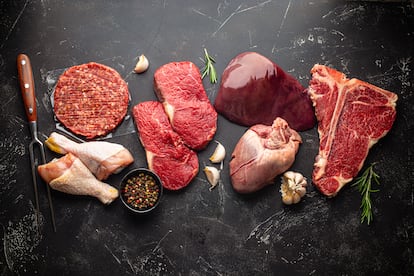Eating nuts instead of processed meat reduces cardiovascular risk by 27%
A review of 37 studies uncovers the consequences of excessive consumption of animal-based foods

If we truly are what we eat, we would be better off as a handful of nuts and an avocado. Consuming these foods instead of animal-based products lowers mortality risk and health issues like cardiovascular disease and type 2 diabetes. A recent systematic review published in BMC Medicine analyzed 37 studies and confirmed the importance of substituting animal-based with plant-based foods. “This doesn’t necessarily mean you have to eliminate all animal products from your diet,” said Dr. Sabrina Schlesinger of the German Diabetes Center (DDZ) and the lead researcher of the study. The key is to reduce consumption of animal-based foods, particularly red and processed meat.
Schlesinger’s team discovered that replacing 50 grams of processed meat (such as cold cuts, hamburgers and sausages) with 28-50 grams of nuts per day reduced the overall incidence of cardiovascular disease by 27%. Substituting with legumes also showed a reduction in cardiovascular disease, though to a slightly lesser extent (23%). Health experts have expressed growing concern about processed meat consumption in recent years. In 2015, the World Health Organization (WHO) classified processed meats as “carcinogenic to humans” and listed it as one of the most hazardous substances to health. The decision caused controversy, but later scientific evidence confirmed concerns about excessive consumption of these products.
The study led by Schlesinger discusses animal products in general, but delving into the details reveals that not all of them have similar health effects. Substituting poultry, fish and shellfish with nuts and legumes did not show a significant reduction in the risk of cardiovascular disease. The study also looked into whether replacing dairy with vegan soy substitutes and the like would have any effect. “Our study did not find any clear associations due to the limited availability of studies on this specific issue,” said Schlesinger.
Manuel Moñino, president of the Spain’s association of dietitians and nutritionists, was not involved in this particular study, but says it “confirms what we already know.” He stressed that reducing doesn’t mean eliminating. “The Mediterranean diet is known for its excellent health benefits. It emphasizes fresh, plant-based foods and includes animal-based foods in smaller amounts.” Instead of examining the specifics of how each substitution affects cardiovascular health, Moñino suggests prioritizing better adherence to the Mediterranean diet.
A few years ago, the American Heart Association ranked the most heart-healthy diets. The DASH diet topped the list (low in salt and high in fruits, vegetables, whole grains, low-fat dairy and lean proteins), followed closely by the Mediterranean diet. In third place was the pescetarian diet, in which protein comes from fish and shellfish, followed by a vegetarian diet that includes eggs and dairy products. All these healthy diets share a common foundation of ample fruits, vegetables, and whole grains, though they aren’t strictly vegan. “Diets high in red and processed meats are linked to increased intake of saturated fats and salt,” said Moñino, “two key elements in increasing cardiovascular risk, especially dyslipidemia [the imbalance of lipids such as cholesterol] and hypertension.”
Meat throughout history
Many recent scientific studies have backed the notion of reducing meat consumption for better health. A few months back, an analysis of studies spanning 40 years confirmed that vegetarian and vegan diets lower blood fats, aligning with the current meta-analysis. “Meat consumption has been on the rise globally due to factors such as population growth, increasing incomes, and dietary changes in certain regions,” said Schlesinger, “although awareness [of the health impacts] is also increasing in some places.”
Francesc Xavier Medina Luque, a professor at the Open University of Catalonia (Spain), says meat consumption is increasing in the West. Medina believes the Schlesinger report is valuable, but wishes it had also considered social and cultural perspectives. The history of meat consumption is crucial to understanding our present-day diets, says Medina.
Meat has always been a part of the Mediterranean diet. Whereas meat was once scarce, it’s now consumed excessively. “Throughout history, meat has been highly valued but difficult to get,” said Medina. But the industrial food revolution in the latter half of the 20th century dropped meat prices significantly. “Suddenly, a highly valued and inaccessible food became widely available.”
“We now consume more meat than ever before, which might explain the emergence of certain diet-related conditions,” said Medina. The social and cultural aspects of eating meat have produced some strong reactions to the scientific recommendations. Perhaps it’s because bountiful meals with meat as the centerpiece evoke warm memories of childhood and festivities. Perhaps it’s because criticism of something so personal stings all the more. “Meat was an identity food in the past,” said Medina. It was an indicator of socioeconomic class — only the wealthiest could afford it. But it always had health repercussions. Gout was a high-class disease, but it was still a disease.
Sign up for our weekly newsletter to get more English-language news coverage from EL PAÍS USA Edition
Tu suscripción se está usando en otro dispositivo
¿Quieres añadir otro usuario a tu suscripción?
Si continúas leyendo en este dispositivo, no se podrá leer en el otro.
FlechaTu suscripción se está usando en otro dispositivo y solo puedes acceder a EL PAÍS desde un dispositivo a la vez.
Si quieres compartir tu cuenta, cambia tu suscripción a la modalidad Premium, así podrás añadir otro usuario. Cada uno accederá con su propia cuenta de email, lo que os permitirá personalizar vuestra experiencia en EL PAÍS.
¿Tienes una suscripción de empresa? Accede aquí para contratar más cuentas.
En el caso de no saber quién está usando tu cuenta, te recomendamos cambiar tu contraseña aquí.
Si decides continuar compartiendo tu cuenta, este mensaje se mostrará en tu dispositivo y en el de la otra persona que está usando tu cuenta de forma indefinida, afectando a tu experiencia de lectura. Puedes consultar aquí los términos y condiciones de la suscripción digital.









































